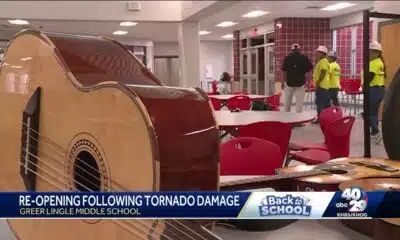News from the South - North Carolina News Feed
Mark Robinson ‘will not run’ for Senate in 2026, as he drops defamation lawsuit against CNN • NC Newsline
SUMMARY: Former Lt. Gov. Mark Robinson announced he will not run for the U.S. Senate in 2026 following controversies that impacted his 2024 governor campaign. Robinson, a Republican, stated he has no plans for future elected office and is dropping a defamation lawsuit against CNN related to negative coverage of his online remarks. Citing a “futile effort,” he directed his attorney to dismiss the case. Robinson emphasized the need for change in the political arena, stating that the sacrifices made in politics are unrecognized and that no monetary compensation could suffice. His withdrawal leaves U.S. Sen. Thom Tillis’s seat contested.
The post Mark Robinson ‘will not run’ for Senate in 2026, as he drops defamation lawsuit against CNN • NC Newsline appeared first on ncnewsline.com
News from the South - North Carolina News Feed
Bracing for sticker shock? Buncombe starts reappraisal in era of fast-rising home prices and after past accusations of inequity • Asheville Watchdog
Raymond Harrell’s hope for the upcoming reappraisal of property in Buncombe County: It goes better than the last one in 2021.
That year, the 44 percent increase in the taxable value of his 772-square-foot, 73-year-old home in the historically Black neighborhood of Shiloh made it a prime example of the county-wide dispute about the reassessment’s equity that dragged on for more than a year.
The county assigned some of the biggest percentage hikes in value – the basis for property tax bills – to homes in two of the lowest-income neighborhoods and the smallest percentage increases to the highest-income neighborhood, Biltmore Forest.
A parade of residents complained about this pattern and their new values. An Asheville-based researcher made presentations detailing what he called bias in the appraisal process. To address his claims, the county formed an ad hoc committee which recommended the hiring of one consultant. The county later hired another.
Though their studies showed no intentional favoritism toward wealthy homeowners, the second of these reports, completed in June 2024, produced a list of inequities built into the system and recommendations to try to weed them out.
The county has acted on many of them, said Buncombe interim Tax Assessor Eric Cregger, beefing up the office’s staff and technology and refining the process for the next reappraisal, which is gearing up now. Later today, Cregger will present the County Commission with the Schedule of Values, the state-mandated document guiding the reassessment due to be completed in January.
But the trend fueling higher tax valuations – soaring home prices – has been even more pronounced in recent years than it was before 2021, creating the potential for many homeowners to be as shocked by their new assessments as Harrell was in 2021.
It wasn’t just the increase that concerned him, he said, but that the value of “my house has gone up a lot faster than homes in some of the other neighborhoods,” such as Biltmore Forest. “Definitely Biltmore Forest,” he said.
Harrell, 61, a county magistrate, could absorb a higher tax bill if Shiloh is hit with similar increases next year, he said, but “it would make it much more difficult for a lot of my neighbors to hang on to their homes, especially the older neighbors.”
Higher home prices, higher valuations
The goal of reappraisals – typically performed every four years in Buncombe but delayed in 2025 by Tropical Storm Helene – is to achieve a sales ratio of 100 percent.
These ratios measure the average appraised value of properties in a county against average sale prices.
In Buncombe, appraisals had fallen to 62 percent of prices by April. That compares to a ratio of about 84 percent in January 2020, the last time the county submitted this figure to the state Department of Revenue before the previous reappraisal (but also before the onset of the red-hot COVID-19 housing market that helped boost appraised values in 2021).

The difference between these ratios is one indication that the new valuations are likely to climb even higher than in 2021. Another is the history of home prices in the county.
Waynesville-based Syneva Economics, the first consultant hired to examine the equity of the last reappraisal, found that average home prices climbed by 43 percent in the six-year period including 2016 and 2021.
Figures provided by Kathleen Cook, a broker with Mosaic Community Lifestyle Realty, showed a median home price of about $340,000 in 2020, the last year before the most recent appraisal. That compares to $515,000 in July, according to the Canopy Multiple Listing Service – an increase of about 51 percent.
Despite a brief dip in home prices after Helene and some signs of a softening market, such as listings lingering for a longer time on the market, prices are still rising, Cook said.
There is more inventory now than in some recent years, she said, but also plenty of demand. That’s partly because, she theorized, potential buyers who had been waiting for interest rates to drop have concluded that’s not happening any time soon.
“I feel like there’s a sense that, this is what the interest rate is, let’s just go ahead and purchase,” she said.
Conflicting reports
Higher valuations don’t necessarily mean higher taxes because local governments typically respond with reductions in tax rates, such as the 2021 cut in Buncombe of 4.1 cents for every $100 of taxable assessed value.
As a result, modest valuation increases can lead to reduced tax bills while big jumps usually mean increases, such as the hike of 34 percent in the total of county and city of Asheville taxes that Harrell saw in 2021.
Because many homeowners in wealthy neighborhoods received lower tax bills after the last assessment, this pattern can highlight the injustice of inequitable reappraisals – which the one in 2021 definitely was, said Joe Minicozzi, founder and principal of the Asheville-based Urban3 economic research firm.

His presentation to the County Commission in 2021 prompted the forming of the Ad Hoc Reappraisal Committee. And in a 2022 follow-up presentation to that committee, a shortened version of which has been posted on Youtube, he said that assessors’ “practice bias” created disparities between Biltmore Forest and low-income neighborhoods.
One example, he says in the video, was the assessment of a 16,000-square-foot home on 22 acres in Biltmore abutting the Blue Ridge Parkway, making it the local equivalent “of waterfront property.” It received a slight reduction in its valuation to just over $3 million, he said, numbers confirmed by country records. Not only did it see that value cut, but the house would likely bring a price many times higher on the open market, he said. “It’s way undervalued.”
Countywide, he said, the reappraisal – by shifting the tax burden from high- to low-income residents – amounted to a “a gift, if you will, to the most high-wealth individuals in the county.”
Former county tax assessor Keith Miller pushed back on some data that Minicozzi presented, including the figures in a side-by-side comparison of Harrell’s assessment with that of a home in Biltmore.
One of Minicozzi’s slides showed a 266 percent “value increase” in the assessment of Harrell’s home, not the 44 percent documented in county records. Minicozzi, responding to an Asheville Watchdog email about this discrepancy, suggested the value might have been changed by the county and noted that the Asheville Citizen-Times wrote a 2021 story based on his comparison. It did, but used the 44 percent figure.
“I have no idea what to say about the Harrell property,” Minicozzi wrote.
The Syneva report also included figures supporting Miller’s argument that the assessments accurately reflected market conditions, including hot and highly localized investment activity in historically Black neighborhoods such as Shiloh and Southside.
Southside saw the highest average increases in home prices of any neighborhood in the county between 2016 and 2021, the Syneva report said, a whopping 116 percent. Its 2021 median increase in valuation, meanwhile, came in at a far lower 26 percent, the report said.
But numbers in both this study and in a presentation from Miller in January 2021, also support the argument that the assessments were inequitable.

That percentage increase in median valuations in Southside – where the average household income is $35,000, the lowest of any neighborhood in Buncombe – was one of the largest in the county, the company’s report said. Close behind was Shiloh, where the increase was 22 percent.
Meanwhile, an area that included Biltmore Forest, with an average household income of $278,000, had the second-highest percentage increase in sales prices, Syneva said. But the Forest’s 4 percent median assessment increase was the lowest in Buncombe, Miller said at a January 2021 presentation that produced the following headline in the Citizen-Times:
“Tax increases likely to hit hard in historically Black Asheville neighborhood … Rich could see decrease.”
Addressing inequities
Kevin Keene, a nationally recognized expert in mass appraisals, conducted the 89-page study for Buncombe completed in 2024. Unlike Syneva, which focused solely on housing and valuation statistics, Keene looked at the appraisal process.
His report praised the county assessors’ “progressive approach to the work,” and wrote that they did “not consider demographics in producing estimates of value.”
But he also found that “bias is entering the valuation process through data collection, valuation process, sales validation, and neighborhood definitions and delineations. Improvements are needed in those areas.”
Among the improvements Keene recommended: refining the boundaries of neighborhoods, filtering out speculative buyers and creating a team of assessors dedicated to addressing sales of luxury homes selling at prices that far exceed the appraised values.
He also wrote repeatedly that the assessor’s office was understaffed and needed to add employees.
Which it has done, Cregger said in an interview last week, creating five additional positions for a total of 35 employees. It has also upgraded mapping tools and other technology, he said.
One of Keene’s recommendations is filtering investment purchases, which means flagging prices that appear to be above market values. It does not go as far as one of Minicozzi’s longstanding arguments on a related issue: The county should appraise short-term rentals as commercial properties, he said, allowing it to factor in their income-generating potential.
That’s not in the works, Cregger said, and referred to a recent blog post from the University of North Carolina Chapel Hill’s School of Government saying that state law requires properties to be appraised based on the estimated sales price “regardless of whether they are occupied by tenants or owners.”
Prices of luxury homes are difficult to access, Cregger said, because some buyers are able to pay prices that “just don’t make any sense.” But because there have been more recent sales in that end of the market, there will be more valid deals to use for comparisons this year, he said.
And his office has, as Keene suggested, created a team to look closer at such purchases as well as similarly unexpectedly high prices paid for properties on the opposite end of the market.
The office will use improved technology and onsite visits to respond to another of Keene’s recommendations, creating better delineations of neighborhoods. This is an attempt to ensure, Cregger said, that large investments in isolated areas of a community don’t unfairly influence values in other sections.
The ad hoc committee also recommended better communications that could help address another source of inequity that Keene highlighted – the appeals process.
This “tends to be biased towards wealthier constituents with higher value properties,” he wrote, because they “can take time off to attend hearings; can avail themselves of professional representation; and often are influential in the community to a degree that can bias the outcome.”
If low-income residents don’t have these resources, they should at least be more aware of their right to appeal, the ad hoc committee’s recommendation said.
This is also in Cregger’s plans, he said.
The county intends to enlist real estate agents to hold clinics and to employ social media and other tools to spread information about appeals.
“This fall, winter and spring, we’ll be out there in the communities … We’ll be online,” he said. “There’s definitely plans for getting some more outreach, especially about appeals.”
Asheville Watchdog welcomes thoughtful reader comments on this story, which has been republished on our Facebook page. Please submit your comments there.
Asheville Watchdog is a nonprofit news team producing stories that matter to Asheville and Buncombe County. Dan DeWitt is The Watchdog’s deputy managing editor/senior reporter. Email: ddewitt@avlwatchdog.org. The Watchdog’s local reporting is made possible by donations from the community. To show your support for this vital public service go to avlwatchdog.org/support-our-publication/.
Related
The post Bracing for sticker shock? Buncombe starts reappraisal in era of fast-rising home prices and after past accusations of inequity • Asheville Watchdog appeared first on avlwatchdog.org
Note: The following A.I. based commentary is not part of the original article, reproduced above, but is offered in the hopes that it will promote greater media literacy and critical thinking, by making any potential bias more visible to the reader –Staff Editor.
Political Bias Rating: Center-Left
This content focuses on issues of property tax reassessment and its impact on historically marginalized, lower-income, and predominantly Black neighborhoods, highlighting concerns about equity and systemic bias. It emphasizes the challenges faced by these communities and the need for reforms to address disparities, which aligns with a center-left perspective that advocates for social justice and fairness in public policy. However, the article maintains a balanced tone by including multiple viewpoints, data, and responses from officials, avoiding overt partisanship or ideological rhetoric.
News from the South - North Carolina News Feed
When will Helene-damaged Broadmoor Golf Course be ready for play? FernLeaf Charter School back in business in previously flooded location? • Asheville Watchdog
Today’s round of questions, my smart-aleck replies and the real answers:

Question: The Broadmoor Golf Course near the airport suffered catastrophic damage during the floods of Helene. Only the driving range has been able to operate. But now there is great activity that looks like the course is being rebuilt. I think the property belongs to the airport, and it is contracted out for management. Who is paying for this work, and when might the course be ready again for play?
My answer: I do miss playing this course, mainly because it’s not often I get a chance to hit a wayward shot onto an interstate, in this case I-26. Usually my drives are confined to the woods or a simple two-lane road.
Real answer: In short, a lot is going on at Broadmoor, which is located off Airport Road about a mile from Asheville Regional. The airport does own the property, but it leases the golf course to a company, DreamCatcher Hotels, which operates the golf course and plans to build a hotel on the property.
Zeke Cooper, president and CEO of DreamCatcher, told me his company has a 50-year lease, and it is committed to site improvements.
“As always planned, we are developing a hotel on the property, which we plan to start site work on later this year,” Cooper said via email.

Helene, which struck our area Sept. 27, inundated the golf course and clubhouse. The French Broad River is close by, and the property is, as the name implies, relatively flat.
“The golf course lost over 1,000 trees and had 12-18 inches of silt covering 60-70 percent of the course,” Cooper said. “The first step was to remove all of the tree debris and remove the silt.”
The company finished that in April, and golf course reconstruction started shortly thereafter.
“The clubhouse had two feet of water on the first floor, with the basement completely submerged,” Cooper said. “The maintenance and irrigation buildings were submerged, resulting in total losses of the buildings and all equipment within them. It was a mess!”
Fortunately, they did have flood insurance. Cooper said total damage exceeded $10 million.
“So a lot of the work is being paid for with insurance funds, as well as our own money,” Cooper said. “We do not have an opening date yet, but expect to reopen in spring of 2026.”
For the golfers out there, Cooper gave a detailed breakdown of all the work they’re doing:
On the golf course: Stripping all greens surfaces, adding in new greens mix and reseeding with bent grass. All greens are completed and currently growing in. The 11th green was completely destroyed, as well as some tee boxes. Those have been rebuilt and are growing in.
All of the fairways and tees have been stripped of silt, regraded and tilled. All of these areas are currently growing in with Bermuda grass.
All of the bunkers were stripped, regraded and rebuilt with new drainage and sand. Sod was used around every greens complex and all bunkers, with the work completed about a month ago.

The irrigation electrical system was destroyed, and has now been replaced. New irrigation pumps have been operational the last couple of months. Workers also had to clean out and replace drainage systems, along with lots of bank restabilization.
Driving range: “We were able to open the driving range in a temporary capacity while work was being undertaken on the course,” Cooper said. “We closed the range on Aug. 11, in order to fix damage from the flood. It is currently under construction and we hope to reopen it in the next three to four months. No timetable, yet, as it’s weather dependent this late in the season.”
Clubhouse, maintenance buildings: The company gutted, cleaned and rebuilt the clubhouse. “We are close to hopefully reopening the clubhouse and restaurant in the next two months,” Cooper said. “We are working on finalizing some construction items for a full Certificate of Occupancy, as well as waiting on furniture, fixtures and equipment.”
The maintenance and irrigation buildings are completed and in use, Cooper added.
Question: What is going on with the FernLeaf Community Charter School in Fletcher? I’ve seen they’re putting back in mobile classrooms in the area that flooded, and it looks like it’s close to reopening. I thought they moved all the students to their location further south that sits on top of a hill?
My answer: I suspect all of the new mobile classrooms are actually barges. Pretty ingenious, really.
Real answer: Back in April I wrote about FernLleaf, the flooding at its location off Howard Gap Road in Fletcher, and the school’s plans to rebuild. Helene’s floodwaters filled the buildings with up to six feet of water and swept some of them off their foundations, Nicole Rule, communications, marketing and events coordinator for the school, said then.
On Monday she had some happy news about FernLeaf’s “second act.”

“On Aug. 13, FernLeaf Community Charter School in Fletcher reopened its Creek Campus — 321 days after Hurricane Helene’s catastrophic flooding swept our main buildings off their foundations and left the campus under several feet of water,” Rule said via email. “In that time, over 430 elementary students and their teachers relocated to our Wilderness Campus (previously home to middle and high schoolers), where they continued learning without missing a beat.”
Rule said, “Community partners, including general contractor Beverly Grant and even the Carolina Panthers Charities (with a $20,000 grant), rallied to help us rebuild.
“While one building is still under construction due to this summer’s unrelenting rain, the reopening marks a milestone for our students, families, and the broader Fletcher/Asheville community,” Rule said. That building should be ready by the end of September.
Michael Luplow, FernLeaf’s executive director, said the school’s “journey has been a powerful demonstration of what we can achieve when we come together.”
“We are immensely grateful for the unwavering support of our students, families, staff, and the broader community,” Luplow said in the press release. “The re-opening of the Creek Campus is not just about a new set of buildings; it is a celebration of our collective spirit and our enduring mission to provide an innovative, inspiring education to our students.”
By the way, FernLeaf did rebuild on the same footprint, which is close to Cane Creek. But this is all approved.
“Since Fern Leaf had previously been constructed in a manner that met our current elevation requirements, they are permitted to go back in at the same elevation,” Town of Fletcher Planning Director Eric Rufa told me in April. “I have encouraged them to go higher, but current circumstances with regard to grade and ADA requirements may hinder that.”
The school did have flood insurance.
Asheville Watchdog welcomes thoughtful reader comments on this story, which has been republished on our Facebook page. Please submit your comments there.
Asheville Watchdog is a nonprofit news team producing stories that matter to Asheville and Buncombe County. Got a question? Send it to John Boyle at jboyle@avlwatchdog.org or 828-337-0941. His Answer Man columns appear each Tuesday and Friday. The Watchdog’s reporting is made possible by donations from the community. To show your support for this vital public service go to avlwatchdog.org/support-our-publication/
Related
The post When will Helene-damaged Broadmoor Golf Course be ready for play? FernLeaf Charter School back in business in previously flooded location? • Asheville Watchdog appeared first on avlwatchdog.org
Note: The following A.I. based commentary is not part of the original article, reproduced above, but is offered in the hopes that it will promote greater media literacy and critical thinking, by making any potential bias more visible to the reader –Staff Editor.
Political Bias Rating: Centrist
The content presents factual information about local community issues, such as flood damage and rebuilding efforts at a golf course and a charter school, without expressing partisan opinions or advocating for a particular political ideology. The tone is neutral and focused on reporting details relevant to the community, reflecting a balanced and nonpartisan approach.
News from the South - North Carolina News Feed
First woman to skateboard across the country arrives in Virginia
SUMMARY: Brooke Johnson, 29, became the first woman to skateboard across the U.S., completing a nearly four-month, 3,000-mile journey from Santa Monica, California, to Virginia Beach. Motivated by a promise to her late stepfather, Roger, who suffered a spinal cord injury and encouraged her to skate across the country, Brooke fulfilled her goal while raising over $54,000 for spinal cord research. Despite emotional and physical challenges, she felt Roger’s support throughout. At the finish line, she wore a necklace containing his ashes, symbolizing their shared journey. Brooke plans to rest before deciding her next adventure. Donations continue via “Brooke Does Everything.”
Brooke Johnson traveled by skateboard from California to Virginia Beach over 118 days to raise over $50000 for spinal cord injury …
-
News from the South - Tennessee News Feed4 days ago
GRAPHIC VIDEO WARNING: Man shot several times at point-blank range outside Memphis convenience store
-
News from the South - Texas News Feed4 days ago
Kratom poisoning calls climb in Texas
-
News from the South - Texas News Feed2 days ago
New Texas laws go into effect as school year starts
-
News from the South - Florida News Feed2 days ago
Floridians lose tens of millions to romance scams
-
News from the South - Kentucky News Feed4 days ago
Unsealed warrant reveals IRS claims of millions in unreported sales at Central Kentucky restaurants
-
Our Mississippi Home7 days ago
Pride of Mississippi Marching Band to Kick Off Season with Free Concert
-
News from the South - Arkansas News Feed6 days ago
Idaho is losing OB-GYNs. Doctors who remain are trying to shoulder the extra burdens.
-
News from the South - Arkansas News Feed7 days ago
Look inside the newly-renovated Greer Lingle Middle School in Rogers













































